Europe's Disintegration: Are National States Waiting for Disintegration?
Scotland: "While in the UK, but we'll see"
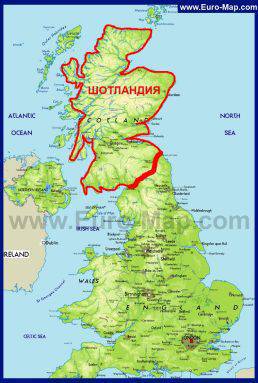 In recent years, Scotland, one of the most economically developed regions of Great Britain, has been very active in its desire to gain independence. It should be noted - not the Scottish radicals from any political party or group, namely Scotland, since the question of independence reflects the interests of the Scottish political and economic elites. Despite the fact that the unification with England was perceived by a significant part of the Scots very painfully, in the end in Scotland there was no nationalist movement comparable in scale to the Irish one. Only in the middle of the twentieth century. Some Scottish politicians and activists talked about the possibility of creating autonomy within the UK. When the Brent oil field was discovered off the coast of Scotland, separatist sentiment began to gain momentum again. After all, having its own oil independent Scotland could feel much more confident, including by replenishing the budget with revenues from the exploitation of the field. In 2007, the leader of the Scottish National Party, Alex Salmond, put forward the idea of political independence in Scotland. After becoming the first minister of Scotland as a result of his victory in the parliamentary elections, Salmond spoke of the need for a referendum in which the Scotland residents themselves could decide whether to declare independence or better to remain in the UK. A significant number of Scots supported the idea of self-determination because of dissatisfaction with the social and economic policies of the British state. In particular, the Scots are convinced that revenues from the exploitation of natural resources in the region, as well as taxes collected from Scottish enterprises, are spent on the needs of Scotland itself only on an insignificant scale. That is, simplifying, Scotland simply "feeds" the rest of the UK.
In recent years, Scotland, one of the most economically developed regions of Great Britain, has been very active in its desire to gain independence. It should be noted - not the Scottish radicals from any political party or group, namely Scotland, since the question of independence reflects the interests of the Scottish political and economic elites. Despite the fact that the unification with England was perceived by a significant part of the Scots very painfully, in the end in Scotland there was no nationalist movement comparable in scale to the Irish one. Only in the middle of the twentieth century. Some Scottish politicians and activists talked about the possibility of creating autonomy within the UK. When the Brent oil field was discovered off the coast of Scotland, separatist sentiment began to gain momentum again. After all, having its own oil independent Scotland could feel much more confident, including by replenishing the budget with revenues from the exploitation of the field. In 2007, the leader of the Scottish National Party, Alex Salmond, put forward the idea of political independence in Scotland. After becoming the first minister of Scotland as a result of his victory in the parliamentary elections, Salmond spoke of the need for a referendum in which the Scotland residents themselves could decide whether to declare independence or better to remain in the UK. A significant number of Scots supported the idea of self-determination because of dissatisfaction with the social and economic policies of the British state. In particular, the Scots are convinced that revenues from the exploitation of natural resources in the region, as well as taxes collected from Scottish enterprises, are spent on the needs of Scotland itself only on an insignificant scale. That is, simplifying, Scotland simply "feeds" the rest of the UK. 15 October 2012 British Prime Minister David Cameron and First Minister of Scotland Alex Salmond signed an agreement according to which the date of holding a political referendum on Scotland’s political independence was set for autumn 2014. However, it should be noted that modern supporters of the independence of Scotland, the country in the case of separation from the UK, will retain the queen as head of state and the pound sterling as the national currency. But the armed forces will create their own, which in turn will be reflected negatively on the defense capability of Great Britain - after all, the Scots have always been considered one of the main pillars of the royal armed forces. 18 September 2014 was held a referendum, which came 84,5% of voters. The majority of voters - 55,3% - spoke out against the proclamation of political independence of Scotland. However, a lesser, but a very impressive number of Scottish voters - 44,7% voted for the separation of Great Britain. This is a very large number, indicating that almost half of the adult Scots do not want to live with the British in a single state. Moreover, depending on the political or economic situation, situational changes, in the foreseeable future, the number of supporters of the full political independence of Scotland may increase. Following the referendum, Alex Salmond, the leader of the Scottish National Party, immediately announced his resignation. But he stressed that if the UK fails to fulfill its obligations regarding devolution, that is, expanding the autonomy of the region, the referendum on independence may be repeated.
Flemish vs Walloons
In Belgium, the main internal contradictions are observed along the line “Dutch Flanders - French Wallonia”. It should be noted that Belgium is a state of two nations. Flemish, constituting the main population of Flanders, speak Dutch, belonging to the Germanic language group. The Walloons, on the other hand, speak French, which is part of a Romance language group. The Flemish are a more cohesive community that does not correlate with the French (Wallonian) culture. Moreover, in terms of understanding the nation, the Flemish to the German model, in contrast to the Walloons, which are, of course, supporters of the French model. In addition, Flanders is a more conservative region, with the traditionally strong influence of the church and more patriarchal foundations. It was the Flemish who fought against the Spaniards in the famous war for the liberation of the Netherlands. However, the roots of the contradictions between the Flemings and Walloons in modern conditions lie not only in the linguistic and cultural, but also in the socio-economic plane.
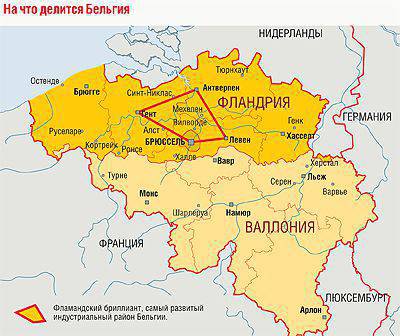 The fact is that for a long time Flanders did not have a high level of economic development. However, in the second half of the twentieth century. began the rapid development of the once lagging region, as a result of which Flanders gradually turned into the main “breadwinner” of the whole of Belgium. Naturally, the Flemish people were puzzled by the question of why they should “feed” the same Walloon, if they can so beautifully exist - as an independent state or, at least, wide autonomy. Moreover, there are sociocultural reasons for this - the Flemish still speak a completely different language and culturally, towards the neighboring Netherlands. Initially in Belgium there was the actual hegemony of the southern, francophone part of the country and the francophone exercised political leadership in the Belgian state. However, a law was later passed that equalized French and Flemish, after which the latter acquired the rights of the language of government in Flanders. Taking into account the specifics of the socio-demographic development of Belgium, which consists in a higher birth rate in Flanders, the number of Flemish population increased, which led to an increase in its role in the political and economic life of the country. In 1980 - 1990 - s. Flanders has become the most economically developed region of the country, in which the main industrial enterprises are concentrated. In the structure of the Belgian exports to Flanders accounts for about 70%. That is, in fact, it is Flanders that currently forms the face of the Belgian economy. She also subsidizes Wallonia and Brussels, since the latter can provide their needs only by 60%, i.e. are dependent on the Flemish region.
The fact is that for a long time Flanders did not have a high level of economic development. However, in the second half of the twentieth century. began the rapid development of the once lagging region, as a result of which Flanders gradually turned into the main “breadwinner” of the whole of Belgium. Naturally, the Flemish people were puzzled by the question of why they should “feed” the same Walloon, if they can so beautifully exist - as an independent state or, at least, wide autonomy. Moreover, there are sociocultural reasons for this - the Flemish still speak a completely different language and culturally, towards the neighboring Netherlands. Initially in Belgium there was the actual hegemony of the southern, francophone part of the country and the francophone exercised political leadership in the Belgian state. However, a law was later passed that equalized French and Flemish, after which the latter acquired the rights of the language of government in Flanders. Taking into account the specifics of the socio-demographic development of Belgium, which consists in a higher birth rate in Flanders, the number of Flemish population increased, which led to an increase in its role in the political and economic life of the country. In 1980 - 1990 - s. Flanders has become the most economically developed region of the country, in which the main industrial enterprises are concentrated. In the structure of the Belgian exports to Flanders accounts for about 70%. That is, in fact, it is Flanders that currently forms the face of the Belgian economy. She also subsidizes Wallonia and Brussels, since the latter can provide their needs only by 60%, i.e. are dependent on the Flemish region. In the economic elite of Belgium, the Flemish took the leading position, respectively, and their influence on the political life of the country increased. The Flemish Interest Party was founded in 1979, in which the Flemish People’s Party and the Flemish National Party were united. The main goal of the party was to achieve independence of the Flemish regions of the country and ensure the rights of the Flemish population. Naturally, the party received widespread sympathy among Flemish voters. At the same time, the party opposed the growth of immigration to Belgium from the countries of the "third world", which also could not help to raise its political rating. However, in the end, the ideas of Flemish separatism in Belgium are less prevalent than in the UK, the ideas of Scottish separatism, as evidenced by the level of support for independence supporters among the Flemish population - it is certainly not low and fluctuates around 14-20%, but it’s not yet possible to call it high, which makes it possible to really talk about the prospects for dividing Belgium into two states. But the constant economic problems faced by the countries of the European Union may lead to a growing number of supporters of Flemish independence and the question of the separation of Flanders, or at least, broad autonomy, will be raised at a more serious level.
Basques stopped blowing, but freedom is required
As for Spain, the national state, originating in the Castilian monarchy of the Middle Ages, has long outlived its usefulness. Several centuries ago, the Castilian monarchs managed to take over other feudal formations of the Iberian Peninsula and subordinate them to their power. Independence was retained only by Portugal, which became one of the most important rivals of Spain during the era of the Great Geographical Discoveries and the subsequent colonization of America, Africa and South Asia. This can be explained by the fact that the Portuguese - a nation with obvious differences from the Spaniards - speaking another, albeit close, language, having its own culture, traditions and customs. But if you take ethnic, linguistic and cultural differences as a basis, the same Galicians, Catalans or, especially, Basques, whose language is not at all similar to Spanish and is the only language in Europe “isolate,” have no less reason for building their own statehood. », Having no relatives among other languages of the world. For a long time, the political dominance of Castile was maintained by force, and this despite the fact that it was precisely the regions inhabited by national minorities that became centers of anti-state resistance.
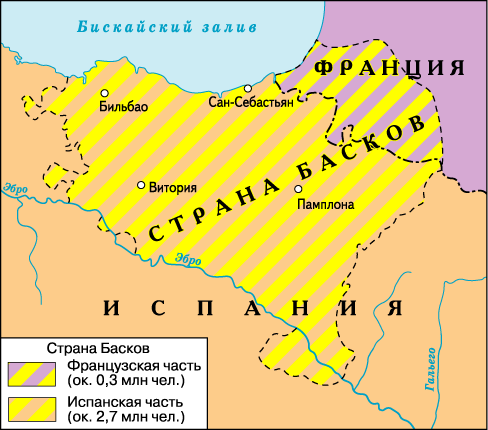 In the Basque Country, the entire second half of the twentieth century, supporters of independence led a fierce armed struggle against the central government. The Basque Left-wing Radical Military-Political Organization ETA (Euskadi Ta Askatasuna - “Basque Country and Freedom”) was recognized as one of the most dangerous terrorist organizations in Europe. It appeared in 1959 as a response to the repressive policy of the Franco regime towards the Basques, the indigenous population of the Basque Country. As is known, Franco completely banned the use of the Basque language and deprived the Basque Country of the privileges of autonomy, which were obtained by the Basques during the existence of the Spanish Republic - in 1936 year. The Basque armed organization received the full support of the world anti-imperialist movement. Basque sympathized with the national liberation movements of African and Latin American countries, the communist parties and radical leftist organizations around the world, who saw in ETA fighters against francism and fascism and shared the desire of the Basque people to gain political independence. Moreover, the majority of ETA members sympathized with socialist ideas and saw the future of the Basque state as socialist. In 1973, ETA killed the Prime Minister of Spain, Admiral Luis Carrero Blanco, Franco's successor as head of the Spanish government. This murder was the most famous combat operation of the Basque liberation movement. Although in 1978, after the democratization of the political regime in Spain, the Basque Country gained maximum autonomy and many privileges that no other Spanish autonomous community possesses, ETA continued to resist in order to achieve full political independence of the Basque Country. For a long time, Spain could not defeat the Basque radicals, despite the fact that it sent all the power of its repressive apparatus to them and even created paramilitary formations of former police officers and military personnel who operated by unlawful means.
In the Basque Country, the entire second half of the twentieth century, supporters of independence led a fierce armed struggle against the central government. The Basque Left-wing Radical Military-Political Organization ETA (Euskadi Ta Askatasuna - “Basque Country and Freedom”) was recognized as one of the most dangerous terrorist organizations in Europe. It appeared in 1959 as a response to the repressive policy of the Franco regime towards the Basques, the indigenous population of the Basque Country. As is known, Franco completely banned the use of the Basque language and deprived the Basque Country of the privileges of autonomy, which were obtained by the Basques during the existence of the Spanish Republic - in 1936 year. The Basque armed organization received the full support of the world anti-imperialist movement. Basque sympathized with the national liberation movements of African and Latin American countries, the communist parties and radical leftist organizations around the world, who saw in ETA fighters against francism and fascism and shared the desire of the Basque people to gain political independence. Moreover, the majority of ETA members sympathized with socialist ideas and saw the future of the Basque state as socialist. In 1973, ETA killed the Prime Minister of Spain, Admiral Luis Carrero Blanco, Franco's successor as head of the Spanish government. This murder was the most famous combat operation of the Basque liberation movement. Although in 1978, after the democratization of the political regime in Spain, the Basque Country gained maximum autonomy and many privileges that no other Spanish autonomous community possesses, ETA continued to resist in order to achieve full political independence of the Basque Country. For a long time, Spain could not defeat the Basque radicals, despite the fact that it sent all the power of its repressive apparatus to them and even created paramilitary formations of former police officers and military personnel who operated by unlawful means. The last attacks of the Basque organization ETA took place back in 2009 - a bomb was blown up near the Civil Guard barracks (analogous to the internal troops in Spain) in Burgos, an explosion occurred at a resort in Palma de Mallorca. However, 5 September 2010, the leadership of ETA issued a statement on the abandonment of the armed struggle and the transition to the peaceful phase of the struggle for the independence of the Basque Country. 10 January 2011 g. ETA officially announced the cessation of hostilities. However, the rejection of terrorist attacks does not mean that the Basque national liberation movement has ceased to exist - its leaders simply realized that in modern conditions of political independence it is easier to achieve by peaceful means.
“Catalonia will be independent”
Catalonia is currently called the region of Spain closest to the real embodiment of the idea of sovereignty. 15% of the population lives in Catalonia. The main part - the Catalans, of which in Spain there are at least 7,5 million. The Catalan language is part of the Occitan-Romance subgroup of the Romance language group of the Indo-European language family and, according to its vocabulary, has the closest relationship with the Occitan language, with the Italian language, and only then with the Spanish and Portuguese languages.
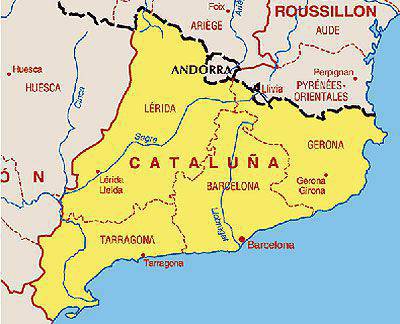 There is a concept of “Catalan lands”, in which the supporters of Catalonia’s independence distinguish Catalonia itself with Barcelona, Valencia, the Balearic Islands, the French department of the Eastern Pyrenees and the dwarf state of Andorra at the junction of the borders of Spain and France. In addition, the Catalan language has speakers on the island of Sardinia - in the city of Alghero, where they speak the Alger dialect of Catalan. In the Middle Ages, several feudal states existed on the territory of the Catalan lands - Barcelona county, Roussillon county, the kingdom of Valencia, the kingdom of Majorca, etc. Later, most of these lands became part of Spain as a result of the marriage of Isabella of Castile and Ferdinand of Aragon. In 1640-1652 there was an attempt to restore the Catalan statehood as a result of the Segador uprising and the subsequent Catalan revolution. On the side of the Catalans, trying to disconnect from Spain, spoke France. 16 January 1641 was proclaimed the Catalan Republic, led by President Pow Clarice, which recognized the French protectorate in exchange for supporting the French crown in resisting Madrid. However, then France, in which internal political contradictions intensified, was unable to provide serious support to the Catalan separatists and Catalonia was forced to capitulate, taking from the Spanish crown promises to preserve a certain autonomy. In turn, the French king received the county of Roussillon as a reward for abandoning territorial claims against Spain.
There is a concept of “Catalan lands”, in which the supporters of Catalonia’s independence distinguish Catalonia itself with Barcelona, Valencia, the Balearic Islands, the French department of the Eastern Pyrenees and the dwarf state of Andorra at the junction of the borders of Spain and France. In addition, the Catalan language has speakers on the island of Sardinia - in the city of Alghero, where they speak the Alger dialect of Catalan. In the Middle Ages, several feudal states existed on the territory of the Catalan lands - Barcelona county, Roussillon county, the kingdom of Valencia, the kingdom of Majorca, etc. Later, most of these lands became part of Spain as a result of the marriage of Isabella of Castile and Ferdinand of Aragon. In 1640-1652 there was an attempt to restore the Catalan statehood as a result of the Segador uprising and the subsequent Catalan revolution. On the side of the Catalans, trying to disconnect from Spain, spoke France. 16 January 1641 was proclaimed the Catalan Republic, led by President Pow Clarice, which recognized the French protectorate in exchange for supporting the French crown in resisting Madrid. However, then France, in which internal political contradictions intensified, was unable to provide serious support to the Catalan separatists and Catalonia was forced to capitulate, taking from the Spanish crown promises to preserve a certain autonomy. In turn, the French king received the county of Roussillon as a reward for abandoning territorial claims against Spain. Since Catalonia was the most developed industrial region of the country and a significant part of its population was made up of representatives of the working class, Republicans were entrenched in it, until the last time they resisted the establishment of the Franco regime. Catalonia during the years of the Spanish Civil War became the epicenter of the Spanish anarchist movement, which had very strong positions in the country. When the Francoists succeeded in suppressing the resistance of the coalition of socialists, communists and anarchists, the repressions affected not only revolutionaries and republicans, but also the Catalan population as a whole. During the reign of the Franco Catalan language, which is spoken by the Catalan population of Spain, was banned, and the Catalan culture had no incentive for development and was also suppressed in every way. Naturally, this caused an extremely negative reaction from the population of Catalonia - both ordinary citizens and the Catalan elite, who hated the Franco regime deep down. Since the end of the XIX century, Catalonia has made repeated attempts to secede from Spain. The first such attempt took place in 1871, and only negotiations with the central government prevented secession and a possible war between the center and Catalonia. In 1930-s, Catalonia again attempted to gain sovereignty, but then turned out to be on the side of the republican movement and played a crucial role in opposing the Francoists. The Spanish dictator Francisco Baamonde Franco in relations with Catalonia proved to be a short-sighted politician. By suppressing the Catalan identity, he only contributed to the growth and strengthening of regionalist and separatist sentiments. It was thanks to the ban of the Catalan language, culture, national organizations that the start of further popularization of separatist ideas among the people of Catalonia was launched. The Catalans reasoned quite explicably - “if we cannot speak our native language as part of Spain and have our autonomy, then should we even separate from Spain?”.
Only after Franco left the life and the subsequent political liberalization, Catalonia received (in 1979) the status of autonomy and achieved official recognition of the Catalan language. However, these measures could not prevent the growth of separatist sentiments in the provinces inhabited by the Catalans. Catalonia, as well as the Basque Country, affected, although to a lesser extent, the radicalization of the movement of independence advocates in the 1970s - 1980s. It was after Franco left that the Catalan separatist military-political organization Terra Liura - Free Land appeared and intensified its activities. She appeared in 1978, and in 1981, she hung banners with slogans “We are a separate nation” at the Camp Nou stadium. “Terra Liura” called the achievement of national sovereignty, the protection of the territory of the Catalan lands, the Catalan language, the interests of the Catalan workers as the main principles of its activities. The organization proclaimed the slogans “Independence or death!”, “Long live the armed struggle”, “United nation - Catalan countries”. In addition to nationalist and separatist slogans, Terra Liura also advanced social ones, being an organization of the left wing. Among the supporters of political independence of Catalonia, socialist ideas were always in demand, because the Catalans understood perfectly well - without transforming social relations, pushing the local big bourgeoisie, which had grown together with the Castilian financial and political elite, would not achieve independence. In 1995, the Terra Leura dissolved itself, after which the struggle for the independence of Catalonia shifted to a more respectable, parliamentary track. Pere Bascompt, one of the leaders of the military-political organization of the Catalans, moved to the Republican Left Party of Catalonia, which was later accused of representing the interests of the "terrorist organization Terra Liura."
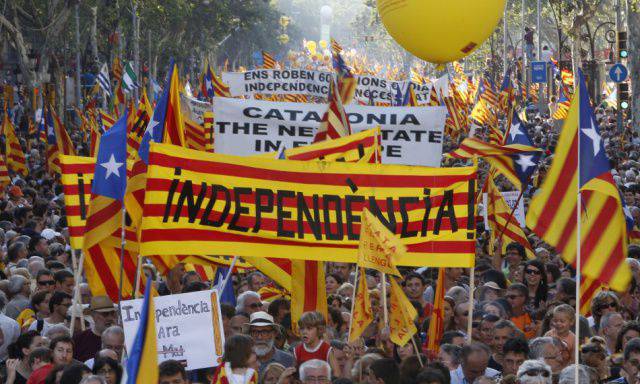
Despite the fact that in the 1990-th - 2000-s. the process of autonomy of Catalonia took place, accompanied by the recognition of the rights of the Catalan language not only as equal to Spanish, but also a priority in the territory of the Catalan lands, the flywheel of striving for sovereignty could not be stopped. Most of the Catalans did not see the political future of the Catalan lands as part of the Spanish state, at least in its modern form. So, in 2009-2010. public opinion polls were conducted, which showed that more than 90% of the inhabitants of Catalonia support the idea of gaining national sovereignty. In September 2012 took place the All-Catalan march under the slogan “Catalonia is the new state of Europe”, in which half a million people took part. Parliamentary elections at the regional level 25 in November 2012 ended with a complete victory for the supporters of sovereignty, who gained an absolute majority of seats in the regional parliament. 23 January 2013 was proclaimed the Declaration of Sovereignty of Catalonia, which provided for the transformation of Catalonia into a "sovereign political and legal entity within Spain". At 2014, the Catalan parliament appointed a referendum on self-determination. It was to be held on November 9. 2014 d. The people of Catalonia were asked two questions - “Should Catalonia become a state” and “Should the State of Catalonia be independent?”. However, the idea of holding a referendum met with sharp opposition from the central authorities. Madrid was not going to allow a referendum, because the mood of the Catalan population was obvious, and a democratically held referendum on the separation of Catalonia would have confronted Spain with the need to recognize its results. Therefore, 27 September 2014. The Spanish Constitutional Court decided to freeze the referendum. Instead of a referendum, a survey was conducted on the political future of Catalonia, which, unlike the referendum, did not have all the legal completeness and its results were not obligatory for any subsequent real actions. However, as a result of a survey 80,8% of citizens participating in it supported the idea of the sovereignty of Catalonia. Despite the opposition of the Spanish government, the movement for the independence of Catalonia does not slow down its activity and, most likely, Europe will sooner or later have to accept the fact that a new sovereign state will appear on the Iberian Peninsula. Of course, Madrid will continue to create all sorts of obstacles to prevent Catalonia from secession from Spain, but in the face of rapid political and economic changes in the life of modern Europe, they may be ineffective. Ultimately, it doesn’t matter to the European Union whether Spain is part of it, or Spain and Catalonia will be included.
Rich North vs. Poor South: Separatism in Italy
Italy has also faced the problem of separatism in recent decades. As in the UK, Belgium and Spain, in Italy centrifugal sentiments have spread in the most economically developed region of the country - in Lombardy and Piedmont. Northern Italy is the flagship of the Italian economy and has a highly developed civil society tradition. Historical the development of this region was significantly different from the path that fell to the lot of southern Italy. In the north of the country, developed urban self-government existed, traditions of civil interaction and cooperation were formed. In the south, up to the twentieth century, feudal orders were preserved, to which the influence of the omnipotent mafia was mixed. The agrarian South is much less economically developed and the "northerners" accuse the "southerners" of the fact that the latter are parasites in the industrial regions of the North, and they themselves bring only a destructive stream into the political life of Italy.
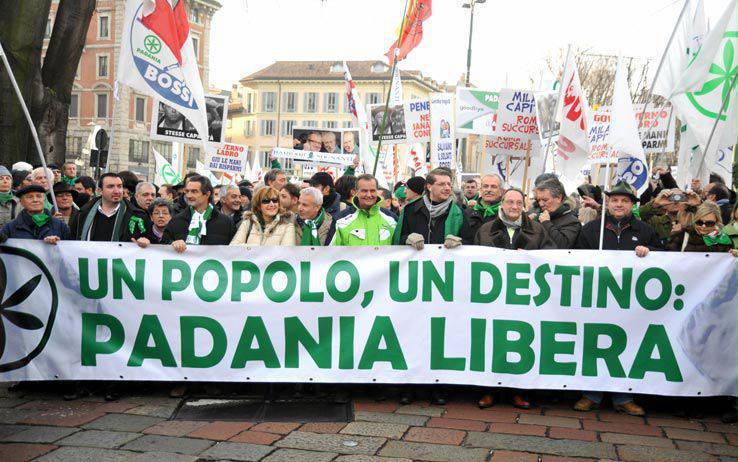
It is the “Southerners”, in the opinion of the “Northerners”, who are to blame for the “mafiezation” of the Italian economy and politics, the corruption of government bodies, and excessive bureaucratization. In 1970-s. to counter these negative trends and protect the rights of the “northerners”, the Lombard, Piedmont, Venetian, and Friulian leagues were formed. In November, 1989 merged these organizations into the League of the North, which put forward the requirement of "federalization" of Italy on a three-part basis - in the Republics of Padania, Etruria and the Republic of the South. In spite of the fact that officially the League of the North puts forward federalist slogans, separatist ideas were widely spread among its supporters. Among them is the proposal for the “self-dissolution” of the Italian state with the subsequent unification of the resulting free regions of Italy into a new confederal entity.
The most actively separatist slogans are supported by the population of Venice and the Veneto region. In 1997, the activists of the Venetian League ostentatiously captured the Campanilla bell tower on St. Mark's Square. Supporters of the independence of the Veneto region appeal to the thousand-year history of the sovereign Venetian Republic, which was one of the most economically and politically influential countries in the Mediterranean. According to representatives of the Venetian League, the entry of Venice into Italy in 1866 was illegal, so a referendum on withdrawal should be held. On 16-21 on March 2014 on one of the Internet sites, a vote was taken on the possibility of granting independence to the Veneto region. 2,36 million people took part in the survey - that is, 63,2% of the total number of Venetians with voting rights in accordance with Italian law. Of the total number of voters, 2,1 million, representing 89,1% of those who participated in the polls, supported the "creation of an independent, sovereign, federal republic of Veneto." The central authorities of Italy, of course, did not recognize the results of this survey, since it had no legal force. After the Venetian League launched a protest, the Italian government switched to open repression against proponents of the independence of Veneto - 24 people were arrested for participating in separatist actions. Among those arrested was F. Rocchetta, the founder of the Venetian League.
Tyrolese hope only for themselves
Another problematic area in Northern Italy is South Tyrol. In Trentino-Alte Adige 70% of the population are ethnic Germans. Here, the socio-economic reasons for discontent with the policies of the central authorities add an ethnocultural factor. After the victory of the Entente in the First World War, South Tyrol was transferred to Italy. So under the authority of the Italian government, in the composition of a country alien to the language, ethnic and cultural respect, there were thousands of Germans and Austrians, who constituted the overwhelming majority of the population of South Tyrol. By the way, the decision to transfer South Tyrol to Italy was actually obtained fraudulently. Italian diplomats slipped a false Tyrolean map to US President Woodrow Wilson, which ignored German toponyms and large German-speaking communities. The American president, in full confidence that restoration of historical justice is taking place and Italy’s lands that were once occupied by Austria-Hungary, are being transferred to Italy, supported the transfer of South Tyrol to Rome. The differences between the Tyrolean Germans and the Italians are great and the German population very much hopes that sooner or later they will be able to acquire political subjectivity. The reason for the deployment of the struggle for the detachment of South Tyrol was the ongoing policy of "Italianization" of the region, the foundations of which were laid in the years of the dictatorship of Benito Mussolini. In 1920 - 1930 - s. German language was banned in South Tyrol, German schools were closed, Italian was widely introduced, geographical names were renamed. The Italian fascists were engaged in unauthorized removal of property from the local population, and Germany, despite the fact that South Germans inhabited ethnic Germans, did not interfere in what was happening - Hitler was more interested in Mussolini as an ally in the coming aggressive war than any peasants living in Tyrol . In republican Italy, the situation did not change and the central authorities in the 1950-ies. continued the course of the "Italianization" of South Tyrol. At least 5% of South Tyrol residents were forced to emigrate to Austria, Germany and Switzerland. Then, in response to the policy of the Italian government, the Committee for the Liberation of South Tyrol was set up - a military-political organization of nationalistic persuasion, advocating the withdrawal of South Tyrol from Italy. The organization acted both by propaganda and by armed methods and carried out a number of terrorist acts against both symbolic objects and specific individuals. January 31, 1961 in Ponte Gardena, the equestrian statue of Benito Mussolini was blown up. On the night of 11 on 12 June 1961 42 power poles were blown up, and a month later 8 power lines were blown up. Italian security forces arrested the leader of the South Tyrol Liberation Committee, Sepp Kershbaumer and 150 movement activists. In conclusion, the Tyrolese separatists were subjected to ill-treatment by the Italian police. Franz Göfler died after breaking his fingers and tearing his ears, leaving him to bleed to death. Anton Gostner was beaten to death. Sepp Kershbaumer was sentenced to 15 years and 11 months, and three years later he died in prison. Violent reprisals against supporters of Tyrolean independence led only to a further intensification of terrorist attacks, and German and Austrian neo-Nazi organizations came to the aid of the Tyrolean separatists. During the “War of Independence” period of South Tyrol, from September 20 1956 on 30 on October 1988, a 361 terrorist act was committed, 15 police officers were killed, 2 accidental civilians and an 4 activist of the South Tyrol Liberation Committee died.
Only in 2001, the South Tyrol was recognized as the autonomous province of Bolzano-Bozen in the Trentino-Alto Adige region, but so far the Tyroleans are hoping to secede from Italy and reunite with Austria. In 2008, residents of 130 settlements gathered signatures on a petition for South Tyrol to enter Austria. According to surveys conducted in 2010, 95% of the population of South Tyrol does not feel Italians. The separatist ideas are shared by the Freedom of South Tyrol and the Union of Tyrol parties. In 2013, the German parties took 80% in the parliamentary elections, which makes it possible to intensify the further struggle for the autonomization and independence of South Tyrol. The second most important requirement, after the expansion of the national rights of the German population, the majority of the German parties in South Tyrol, remains the requirement to restrict migration to the territory of the province and region. Residents of South Tyrol fear that the Italian leadership is “de-Germanizing” the region through the resettlement of Italians from other provinces and migrants from Asia and Africa. The specificity of the South Tyrolean separatism lies in the absence of sympathy for left radicalism, characteristic of Basque, Catalan, Sardinian, Irish nationalism. The South Tyrolean separatists can rather be defined as supporters of self-determination of a closed German-speaking community who do not pretend to more than the expansion of rights and the subsequent achievement of independence or reunification of the territory of residence with Austria. Since neither Austria nor Germany takes serious steps to protect the rights of the Tyrolean Germans to self-determination, the latter can only rely on themselves and interact with their “colleagues in misfortune” - the Transylvanian Hungarians, who are also trying to secede from Romania and reunite with Hungary.
Fragmentation of large national states is beneficial for both supra-state formation - the European Union and transnational corporations. But for the national states themselves, the loss of large and economically developed regions can turn into a real catastrophe of statehood, leading to a complete disintegration and disappearance from the political map of Europe. What will happen to Spain if, following Catalonia, the Basque Country, Galicia and Asturias separate? It is unlikely that Great Britain will retain its status of power if Scotland leaves, and then Wales. Can Italy exist without developed industrial regions of the North? That is the question. On the other hand, the split of the national states of Europe without deepening European integration will lead to the formation of a multitude of small states, albeit economically developed, but weak politically and politically and, therefore, not representing a competitive danger to those large states that will retain their territorial integrity and political unity.
- P P 'SЊSЏ RџRѕR "RѕRЅSЃRєRёR№
- http://www.kommersant.ru/, http://www.golos-ameriki.ru/, http://www.vestifinance.ru/
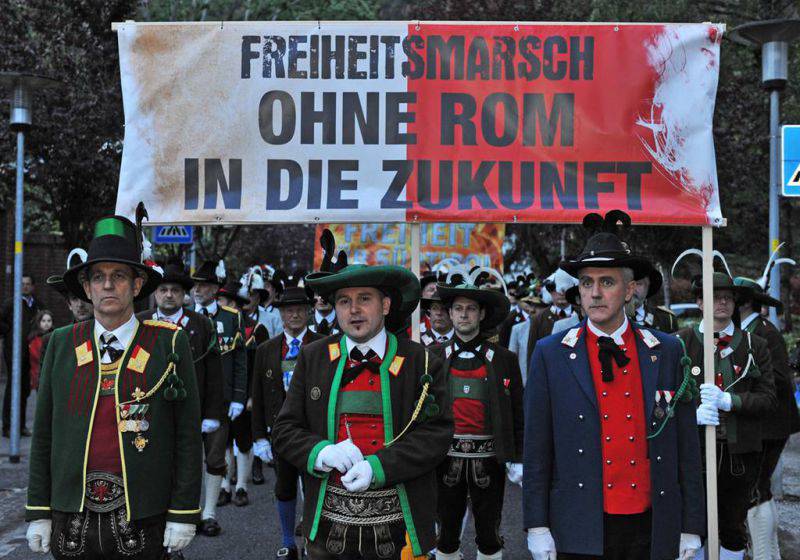
Information